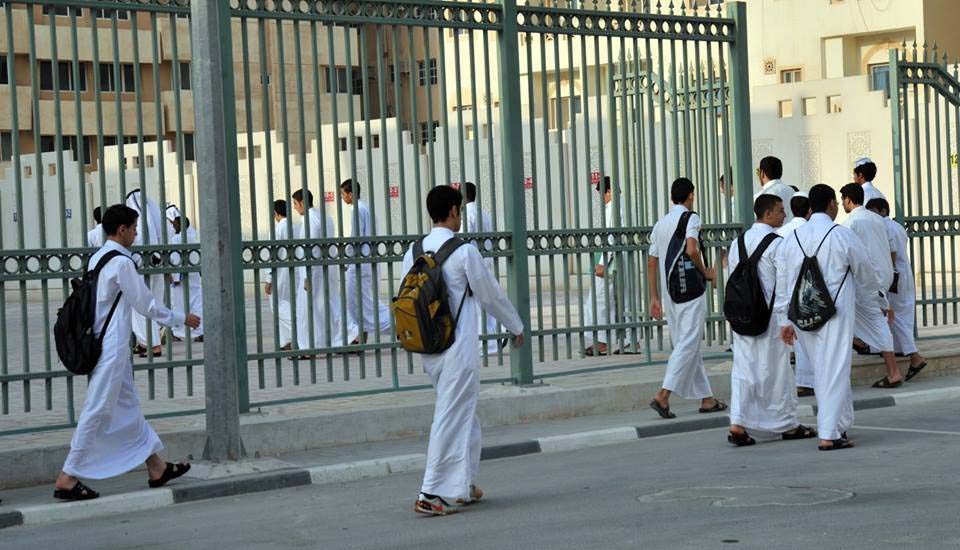Health officials have been encouraging parents to vaccinate their children to ensure safety on school grounds.
Over 55 percent of children aged 12-15 years are now fully vaccinated against the Covid-19 virus, a senior health official confirmed on Monday.
“I would like to inform parents that up to now, more than 55% of the 12-15 age group have received both doses of the (Covid-19) vaccine,” said Dr. Soha Al-Bayat, head of the Vaccination Department at the Ministry of Public Health (MoPH) and leader of the Covid-19 tracing and detection team.
Although the numbers mark another milestone in the national vaccination campaign, the ministry stressed that all students without exceptions should adhere to the Covid-19 measures implemented in schools.
Implementation of precautions measures in schools to ensure the safe return of students
Dr. Soha Al-Bayat
Head of Vaccination Department at
MoPH and Leader of the COVID-19
Tracing and Detection Team#Backtoachool @Qatar_Edu pic.twitter.com/8HOC5tnX9v— وزارة الصحة العامة (@MOPHQatar) August 30, 2021
“It’s a good percentage but we need more. So, I urge all parents who have not yet vaccinated their children to do so to ensure their well-being and good health. Wishing our students an exciting year and a healthy one,” she added.
The Ministry of Public Health in cooperation with the Ministry of Education and Higher Education have been working relentlessly to ensure that all necessary safety measures are in place by the start of the academic year 2021/22, Al-Bayat noted.
“The 50% attendance (system) assures us that there will be no crowding in the classes. Also, all classes were set up to have a minimum space of 1.5m between each student,” the doctor explained in a recorded video conference shared on the MoPH Twitter account.
School Health Supervisor Ayman Alsahory said: “School staff and students above 12 years are urged to get the vaccine against Covid-19, in addition to adhering to the measures to prevent the spread of infection.
“These include wearing a mask, washing hands, using sanitisers and maintaining social distance,” he added.
“To begin the new academic year in Qatar, we have prepared a protocol for school health as a comprehensive guide for the preventive and precautionary measures, which should be implemented in schools to prevent the spread of Covid-19,” he continued.
Alsahory said that during the current academic year, several activities and awareness campaigns will be launched to ensure all are aware of how to keep safe.
These will include teaching preventive measures, practising social distancing and hand hygiene, and the rules of coughing and sneezing, as well raising awareness on the importance of a healthy diet in enhancing immunity.
Read also: 94% staff vaccinated as ministry launches ‘back to school’ campaign
“We would like to emphasise the role of parents in preparing their children to return to school by ensuring an early bedtime, maintaining a healthy diet, educating children about the importance of preventive measures, and visiting the health centre when they feel sick,” he advised.
Meanwhile, a number of public school administrators told local Arabic news ‘Al Raya’ that around 80% of the permitted number of students attended classes on the first school day (29 August), which they believed was “a good rate.”
Most schools reopened their doors for the new academic year on 29 August with a 50% blended learning system in place, that includes a rotational attendance plan.
Earlier, the education ministry confirmed that around 94% of teachers and administrative staff in all public and private schools as well as kindergartens in Qatar have been fully vaccinated against Covid-19.
The latest figures show that 94.2% of the eligible population have received at least one dose of vaccine, and over 70% of the population are fully vaccinated against the coronavirus.
Blended learning: How it works
The fast and effective rollout of the anti-Covid vaccines has aided the country in resuming on-campus learning at 50% capacity.
Under the blended learning system, 50% of students will be physically attending classes, while the other 50% will attend lessons remotely, in line with the rotation plan set by schools.
“The blended learning system has become the best option to ensure the continuity of the educational process without interruption and to ensure the quality of education while maintaining the health and safety of students,” said Minister of Education and Higher Education Dr. Mohammed bin Abdulwahed Al Hammadi.
Covid-19 protocols will be in place at all schools.
This includes bubble arrangements that serve as an effective preventative measure to help curb the spread of Covid-19 within the community.
Read also: Qatar receives first batch of AstraZeneca Covid-19 vaccines
Schools are required to have nursing staff on a daily basis and visitors and employees are required to show the Ehteraz application and have their temperature checked before entering the school premises.
If any Covid-19 infection is detected, parents or school staff must report immediately to MoPH and MoEHE.
In case of an increased number of Covid-19 cases reported in a certain institution, the school or kindergarten will have to switch to 100% online learning, after the approval of MoPH.
“The Ministry of Education has issued guidelines for face-to-face and online learning in kindergartens with a maximum 15 students per classroom, with the need to utilise the school theatre and sports halls as classrooms to maintain social distancing,” MoEHE’s Assistant Undersecretary for Educational Affairs, Fawzia Abdulaziz al-Khater, said.
“Kindergartens need to communicate with parents, informing them of their children’s rotation schedules.
“In addition, morning assemblies, group activities such as excursions, camps and celebrations are to be cancelled and organised virtually where applicable,” she stated.
Only students from low-density schools in remote areas, low-density specialised schools, specialty schools for students with disabilities, will be attending with 100% on-campus learning.
Follow Doha News on Twitter, Instagram, Facebook and Youtube
